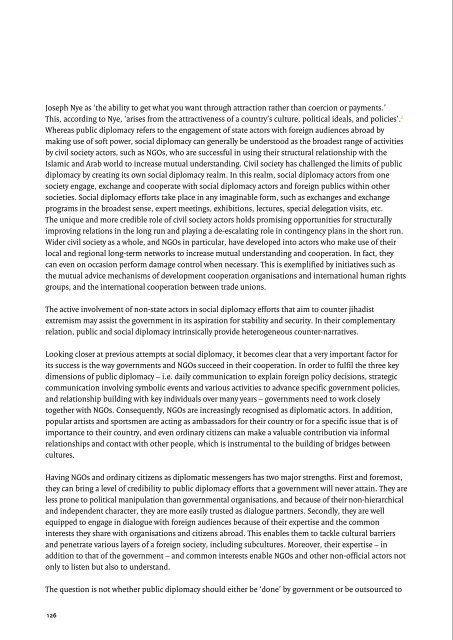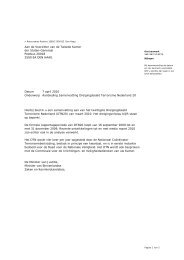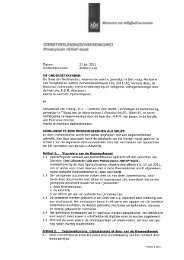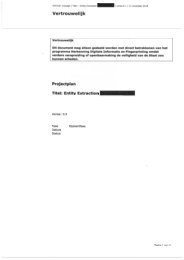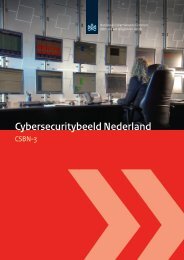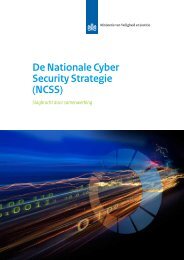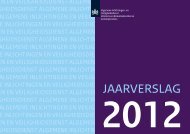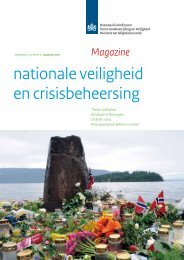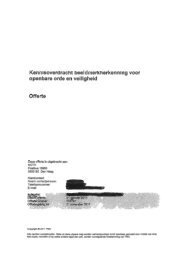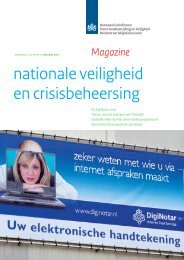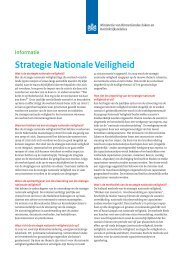Countering Violent Extremist Narratives
Countering Violent Extremist Narratives
Countering Violent Extremist Narratives
- No tags were found...
Create successful ePaper yourself
Turn your PDF publications into a flip-book with our unique Google optimized e-Paper software.
Joseph Nye as ‘the ability to get what you want through attraction rather than coercion or payments.’This, according to Nye, ‘arises from the attractiveness of a country’s culture, political ideals, and policies’. 2Whereas public diplomacy refers to the engagement of state actors with foreign audiences abroad bymaking use of soft power, social diplomacy can generally be understood as the broadest range of activitiesby civil society actors, such as NGOs, who are successful in using their structural relationship with theIslamic and Arab world to increase mutual understanding. Civil society has challenged the limits of publicdiplomacy by creating its own social diplomacy realm. In this realm, social diplomacy actors from onesociety engage, exchange and cooperate with social diplomacy actors and foreign publics within othersocieties. Social diplomacy efforts take place in any imaginable form, such as exchanges and exchangeprograms in the broadest sense, expert meetings, exhibitions, lectures, special delegation visits, etc.The unique and more credible role of civil society actors holds promising opportunities for structurallyimproving relations in the long run and playing a de-escalating role in contingency plans in the short run.Wider civil society as a whole, and NGOs in particular, have developed into actors who make use of theirlocal and regional long-term networks to increase mutual understanding and cooperation. In fact, theycan even on occasion perform damage control when necessary. This is exemplified by initiatives such asthe mutual advice mechanisms of development cooperation organisations and international human rightsgroups, and the international cooperation between trade unions.The active involvement of non-state actors in social diplomacy efforts that aim to counter jihadistextremism may assist the government in its aspiration for stability and security. In their complementaryrelation, public and social diplomacy intrinsically provide heterogeneous counter-narratives.Looking closer at previous attempts at social diplomacy, it becomes clear that a very important factor forits success is the way governments and NGOs succeed in their cooperation. In order to fulfil the three keydimensions of public diplomacy – i.e. daily communication to explain foreign policy decisions, strategiccommunication involving symbolic events and various activities to advance specific government policies,and relationship building with key individuals over many years – governments need to work closelytogether with NGOs. Consequently, NGOs are increasingly recognised as diplomatic actors. In addition,popular artists and sportsmen are acting as ambassadors for their country or for a specific issue that is ofimportance to their country, and even ordinary citizens can make a valuable contribution via informalrelationships and contact with other people, which is instrumental to the building of bridges betweencultures.Having NGOs and ordinary citizens as diplomatic messengers has two major strengths. First and foremost,they can bring a level of credibility to public diplomacy efforts that a government will never attain. They areless prone to political manipulation than governmental organisations, and because of their non-hierarchicaland independent character, they are more easily trusted as dialogue partners. Secondly, they are wellequipped to engage in dialogue with foreign audiences because of their expertise and the commoninterests they share with organisations and citizens abroad. This enables them to tackle cultural barriersand penetrate various layers of a foreign society, including subcultures. Moreover, their expertise – inaddition to that of the government – and common interests enable NGOs and other non-official actors notonly to listen but also to understand.The question is not whether public diplomacy should either be ‘done’ by government or be outsourced toextra-governmental actors. In the current globalised environment in which nations are confronted witha broad variety of both national and international issues, the right mix must be found between those twoentities – to be created, regularly revised and sustained.An example in which such a successful mix has been found are the civil society initiatives that were organisedto respond to the release of the controversial movie ‘Fitna’, created by the Dutch MP Geert Wilders. FORUMwas one of several institutes that deployed such initiatives. Letters were written to governments of Islamiccountries and to the Organisation of the Islamic Conference, Dutch embassies were contacted and visited,talks were held with influential Islamic leaders, a fact book concerning the democratic rights of Muslimsand Muslim organisations in the Netherlands was distributed in Islamic countries, and interviews andinformal press meetings were held with various media in Islamic countries. The central message was clearand present across the board: Muslims in the Netherlands are not oppressed, they are not interested inforeign interferences, and they are very much in favour of the freedom of expression.Whilst the public diplomacy efforts undertaken by the Dutch government mainly focused on the officialposition of the Dutch government and the legal aspects concerning the release of the movie, the socialdiplomacy narratives and actions presented a wider perspective of the Dutch context and the impact andperception of the movie in the Netherlands. This addition of social diplomacy efforts to the publicdiplomacy strategy resulted in a relatively calm reaction to the release of the movie. All these actionscombined form an example of both the potential impact of successful social diplomacy and the importanceof the right mix between public and social diplomacy.TensionsNevertheless, governments and civil actors such as NGOs are faced with various challenges when cooperatingwith each other. One of the principal tensions relates to the question of how to deal with the autonomyof such non-governmental actors. How can the factors that ensure civil society’s credibility be preserved,whilst at the same time making its role more structural in the national public and social diplomacyapproach? Many critics have called for institutionalised cooperation between government, civil society andbusiness. According to this multi-stakeholder diplomacy approach, governments would be able to draw onthe expertise, access and legitimacy of civil society and businesses to further public diplomacy goals, whilstcivil society actors may in turn for instance gain financial and logistical support from the government. 3The problem with this scenario is summarised by Shaun Riordan: ‘Many potential agents are reluctant tobe associated with government. In as far as they are perceived to operate under government direction, orwith government funding, their credibility and effectiveness can be undermined. Their involvement in asocial diplomacy strategy can therefore be highly problematic.’ 4 If NGOs and other civil society actors areto remain credible, they should be able to freely voice both their agreement with and their criticism ofgovernmental actions. 5 Any possible association with a government must therefore be shaped according tocareful considerations, which serve both the national public diplomacy strategy and the necessary abilitiesof civil society to perform social diplomacy independently and effectively.When turning to the issue of radicalisation and violent extremism, the tension between the actors ofpublic and social diplomacy described above certainly becomes apparent. For example, when cases ofradicalisation and extremism are on the increase, and the government and certain sections of the publicperceive this as a real threat, will there be enough space for civil society actors to question this perception?126 127


